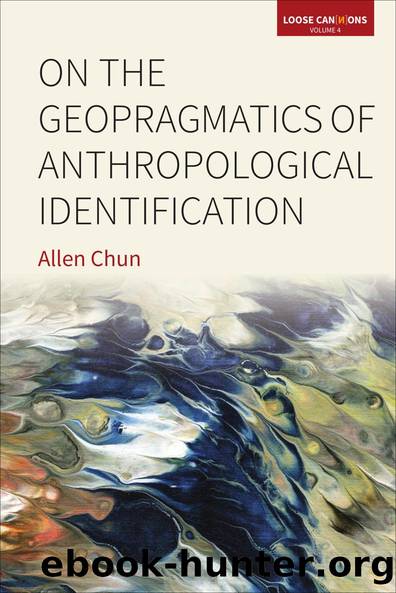On the Geopragmatics of Anthropological Identification by Allen Chun

Author:Allen Chun [Chun, Allen]
Language: eng
Format: epub
ISBN: 9781789202038
Barnesnoble:
Publisher: Berghahn Books, Incorporated
Published: 2019-04-01T00:00:00+00:00
Theory as Narrative: The Birth of Society and the Norm from Durkheim to Foucault
An assumption that drives the social âsciences,â notably anthropology and sociology, is a firm belief in their epistemological and methodological objectivity, or the sui generis nature of âsocial facts,â as Durkheim phrased it. However, objectivity here can refer to many things that have been confused in actuality. First, it refers to a belief in the inherent neutrality of its methodology of observation and modes of systemic analysis. Second, this neutrality is predicated on the assertion that its object of study is considered external to the observer. Ultimately, this sense of distance (between observer and observed) contributes to the sense of detachment (of the values of the observer from their own cultural milieu) that is necessary to the analysis.6 In this regard, it is interesting to note that functionalism has its ânatural science of societyâ (as coined by Radcliffe-Brown) and that structuralism has its âscience of the concreteâ (as coined by Lévi-Strauss), both of which reiterate from different (if not opposing) methodological perspectives the same âgazeâ that underscores all social scientific epistemologies. Moreover, I argue that the epistemological and methodological assertions that are essential to the social scientific enterprise, ideally stated as they are, are themselves based on a mythical narrative about the nature of âsocietyâ (as both external social facts and systemic reality). In other words, the sociological âimaginationâ is just that: a set of fictions whose hypothetical assertions have never been proven, except in other logical terms. In this regard, Michel Foucaultâs impact is clear, especially when juxtaposed against classical sociological narratives of modern society, by showing how the scientific claims about society made in this âimaginationâ are themselves a peculiar historical-cultural product of a broadly defined Eurocentric modern imagination. From Foucaultâs narrative of the birth of the social sciences as a function of modern societyâs disciplinary will to power emerge the epistemic conditions that give rise to the curious illusion that culture and social organization (or ideology and praxis) are analytically distinct, when their fates are in fact intertwined.
The notion that society exists in and of itself (independent of individualistic rational, calculating action) is a relatively recent discovery in the history of sociological thought. Just as modern sociology distinguished itself in contrast to other disciplines through its monopoly over what is now called the âsociological imagination,â anthropology was also no less founded in reaction to the anthropocentric illusion of humankindâs control over civilization (see, e.g., Mills 1959; White 1948).7 The extent to which Durkheim was able to sanctify the reality of society among individuals reflects the extent to which society as an analytical construct has become an unquestioned reality in the minds of social scientists.8 Viewed in this light, Durkheimâs works are in essence attempts to articulate a âmythâ or ideological proof about the reality of society in opposition to what was the prevailing utilitarian rationale of the day. However, continued ambiguities in his definition of key concepts then paved the way for divergence in
Download
This site does not store any files on its server. We only index and link to content provided by other sites. Please contact the content providers to delete copyright contents if any and email us, we'll remove relevant links or contents immediately.
Cecilia; Or, Memoirs of an Heiress — Volume 1 by Fanny Burney(32538)
Cecilia; Or, Memoirs of an Heiress — Volume 2 by Fanny Burney(31936)
Cecilia; Or, Memoirs of an Heiress — Volume 3 by Fanny Burney(31925)
The Great Music City by Andrea Baker(31911)
We're Going to Need More Wine by Gabrielle Union(19032)
All the Missing Girls by Megan Miranda(15927)
Pimp by Iceberg Slim(14476)
Bombshells: Glamour Girls of a Lifetime by Sullivan Steve(14046)
For the Love of Europe by Rick Steves(13872)
Talking to Strangers by Malcolm Gladwell(13341)
Norse Mythology by Gaiman Neil(13333)
Fifty Shades Freed by E L James(13229)
Mindhunter: Inside the FBI's Elite Serial Crime Unit by John E. Douglas & Mark Olshaker(9313)
Crazy Rich Asians by Kevin Kwan(9271)
The Lost Art of Listening by Michael P. Nichols(7487)
Enlightenment Now: The Case for Reason, Science, Humanism, and Progress by Steven Pinker(7303)
The Four Agreements by Don Miguel Ruiz(6739)
Bad Blood by John Carreyrou(6610)
Weapons of Math Destruction by Cathy O'Neil(6261)
